The following translation from the Japanese-language autobiography entitled Aikido Jinsei (An Aikido Life) by Gozo Shioda Sensei of Yoshinkan Aikido is published with the kind permission of the author and the publisher, Takeuchi Shoten Shinsha. The series began with AIKI NEWS No. 72. Read the fifteenth part here.
The founder of Yoshinkan Aikido continues the story of his experiences during the war years in the South Pacific. He is transferred from Pontianak to Makassar where he saves the day for the Taiwan Colonization Company by rounding up 150 bicycle tires despite a critical shortage caused by the War.
My Transfer To Makassar
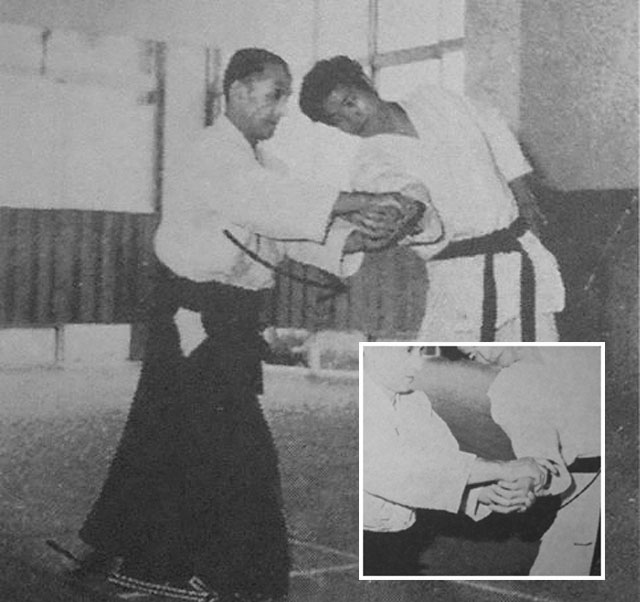
When I look back on those times I realize that I was too self-complacent, due to my immaturity and lack of experience. In addition, I think that the time and place in which I was living, the fact of the war and its proximity, made me behave out of character. On the personal level, such silly acts may have arisen from the fact that at the office I was in charge of accounting, in which I was not at all interested. At any rate it all stemmed from my immaturity.
Our payday was the 20th of each month, and I was in charge of making the payments. I used to calculate the total amount of salary for eight people, and after drawing the money from the Taiwan Bank, I would place it on top of my desk and call each of my staff, one by one, and ask, “How much is your salary?” He would answer, and I would tell him to take that amount from the stack of bills. I used to put only the money for the President into a pay envelope. I think that this is one of the reasons that the President was critical of me. So, perhaps it was only natural that such a disturbance as I described before [AN86] occurred. I lived this way from day to day.
In November of 1943, a telegram from the head office was delivered to the President. It ordered the transfer of Director Shioda to the Makassar Branch. It was sudden and unexpected, and I was astonished because I could think of no reason for such a transfer. At that time the director of the Makassar Branch was Mr. Kazuo Iwata. I had met him at my going away party in Taiwan just before I left for southern Asia, and I was favorably impressed. So I wrote to him asking the reason. A short while later he replied, “Mr. S., who had been a Director in the General Affairs section, misappropriated company money and was fired. I recommended to the head office that you succeed to this post.” I understood the situation and began to prepare for my departure.
I was pleased with this transfer because Mr. Shigeeda was living in Makassar, and that city was larger than Pontianak, so I could anticipate a lively and fun life.
It was a great deal of work to get ready to go. I had to dispose of many of the animals which I had kept in the Shioda Zoo. I slaughtered some each day and invited many guests to dinner. Every night many people came to my house for merry drinking parties. I was to leave my old post on December 1, so it was all right for me to move any time during December. Since I had plenty of time, I was leisurely in making my preparations to move, and everyday I held big parties. I think Omori must have been relieved at my departure, but Kagawa was still there. He was ordered to succeed me, to deal with the tanning business. He seemed depressed and felt very lonely, which was not at all like his usual self. I was provided with as much money as I needed to prepare for my move. I had a kind of rectangular box made of ironwood and put various things in it. I had many bags too, so all told I had 21 pieces of luggage. Also, I had a cage for the monkeys made, with iron netting on the front, as well as two boxes for the orangutans. I gave the deer and dogs to some Indonesians. Yokichi, who had been my servant, did not want to leave me, so I decided to take him with me to Makassar.
Farewell Party
As the day of my departure drew near, President Omori took the lead in holding a series of grand farewell parties for me, the likes of which had never been seen before. I suppose it was because he was so pleased with my transfer. They were held almost every night. Since I had become acquainted with many people, such as in the Tokkei and in local businesses, there were many who were reluctant to see me go. I was deeply moved by the number of people who were going to miss me. I had known them for less than one year, but even now I can remember vividly, as if it were only yesterday, how deeply they moved me. On December 28, 1943, I boarded my ship. Many people came to see me off at the pier. After the ship had pulled away, they still did not leave and waved as we left. I was moved to tears and waved in response to their farewell. At last I left Pontianak in the company of my servant Yokichi.
When I look back on those times I realize that I was too self-complacent, due to my immaturity and lack of experience. In addition, I think that the time and place in which I was living, the fact of the war and its proximity, made me behave out of character. On the personal level, such silly acts may have arisen from the fact that at the office I was in charge of accounting, in which I was not at all interested. At any rate it all stemmed from my immaturity.
I arrived at Makassar via Surabaya on about January 5th or 6th, 1944. As soon as I arrived, I went to a hotel and informed the Taiwan Colonization Company office of my arrival. Soon a man from the General Affairs section came to see me and said, “Please stay at this hotel tonight, and I will come again tomorrow and show you your lodgings.” Since I knew the address of Mr. Shigeeda, who had been transferred to Makassar earlier, I called him. He was very pleased that I had arrived, and told me to come to his house as soon as possible. So I went directly to his house. He was as merry as a child, and that day I was entertained with all sorts of delicacies. We talked of Pontianak and such until late at night, so I ended up staying at his home that night.
My First Job, Collecting Tires
At that time Mr. Shigeeda was working for the Makassar Civil Government. The naval base was located in Makassar and the General Headquarters of the navy operations in southern Asia was also part of the head office of the Makassar Civil Government. Formerly known as the Civil Administration Bureau, its name was changed to Civil Government, and it supervised civil affairs. Mr. Shigeeda, who was Director of the Agriculture, Forestry and Fisheries Department of the Civil Government, was active in his job. This department was closely connected to and influential with businesses, and more than one hundred businesses were under his supervision. No matter how famous a firm might be, if they could not get permission from this department, they could do nothing at all. It was a great advantage to my company that I was a friend of his. He was a very firm-minded man of high principles, although he did not look the part. He used to firmly refuse all offers of bribes from businesses. But the businesses would ignore his refusals and press him even further with money. Whenever such offers came his way, he used to come to see me and ask my advice. I told him the following as if I were telling it to myself, “Once you are convinced that you are right, I think it is all right to do things the way you want. But anytime you discover that your actions are wrong, you must decisively stop what you are doing. You must always work to the advantage of Japan and always act based on this creed. ‘An honest man is the final victor,’ my father used to say to me, and I have kept these words as my motto.” He heartily agreed with me. He dealt with various situations resolutely after he had considered them carefully. Since he was about my age, we were generally of the same opinion. He may have come to see me to reassure himself that his decision was the right one and he may have also wanted to have someone with whom he could talk without reserve.
The morning after my arrival at Makassar, I went to see the Director of the Makassar Branch to report in and to take up my new job. Mr. Iwata, the Director, was very pleased to have me, and held a big reception for me. The primary jobs of the Taiwan Colonization Company in Makassar were the cultivation and shipping of cotton, and the making of salt. Under the Branch Director, there were three directors, the Director of General Affairs, the Director of the Cotton Department, and the Director of the Salt Production Department. The Director of General Affairs was Mr. Nakahama, who had been sent by the Taiwanese Government and who happened to be my senior at university. When I went to see him, he welcomed and encouraged me, saying that we both should do our best. I was appointed as a Director of General Affairs under the supervision of Mr. Nakahama.
Since I had become acquainted with many people, such as in the Tokkei and in local businesses, there were many who were reluctant to see me go. I was deeply moved by the number of people who were going to miss me. I had known them for less than one year, but even now I can remember vividly, as if it were only yesterday, how deeply they moved me.
At that time there were one hundred and four employees of the Makassar Branch of the Taiwan Colonization Company, including the members of the Cotton and Salt Departments. In my General Affairs Section, there were eight people, and they served as higher functionaries, so to speak. This section encouraged the employees of the Taiwan Colonization Company to work willingly and loyally for the company, and also to contribute to the general development of the company.
In the beginning of 1944 we did not suffer seriously from shortages, physically or spiritually, and the Japanese in Makassar lived their daily lives in comfort. But day by day commodities gradually became scarcer. At that time we used bicycles to get to the office. At first, bicycles tires were not so readily available at the markets in Makassar, so there were not enough to meet our needs. So I gathered together Chinese merchants in Makassar and asked them to collect tires. As might be expected they had been farsighted about the inevitable shortage of tires and had been buying them for some time. One of the two leaders of the Chinese merchants in Makassar had been introduced to me by a leader of Chinese merchants in Pontianak. Before I left he gave me a letter of introduction to the leader in Makassar, predicting that it would surely be useful for me in the future when I was in Makassar. I immediately contacted this man, then went to see him. He was as an important a man as I had expected, so when I showed him the letter, he promised with complete confidence to help me. First, I asked him to collect one hundred and fifty tires, and he instantly agreed to do so. A little amazed, I returned to the office, and reported to Mr. Nakahama. He praised my efforts, “Excellent! I give you complete authority concerning this matter, so you may do as you like. Whenever you need money, I will raise it.”
At that time we could not have found any tires at all on the market, and all the businesses in Makassar needed them urgently. They eagerly tried to collect them, but in vain. They were unable to find even five or ten tires, much less one hundred and fifty at once. But I did it! My first job in Makassar was to collect bicycle tires.
The above translation is from the Japanese-language autobiography entitled Aikido Jinsei (An Aikido Life) by Gozo Shioda Sensei of Yoshinkan Aikido. The translation is published with the kind permission of the author and the publisher, Takeuchi Shoten Shinsha. Find out more about the book here.

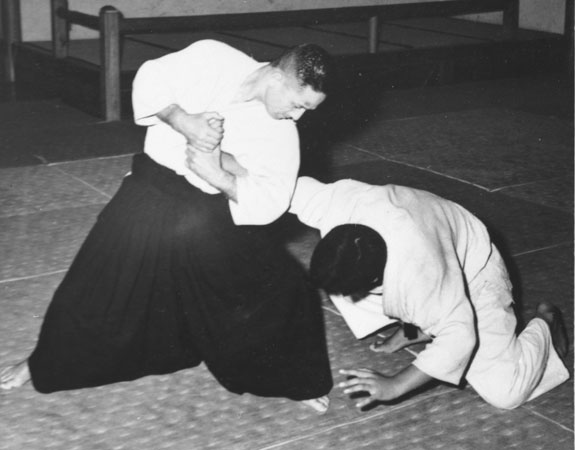

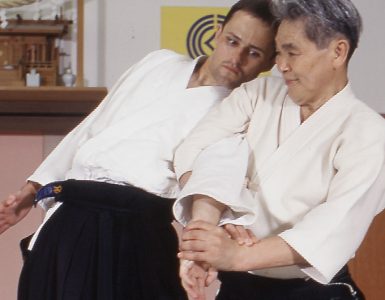
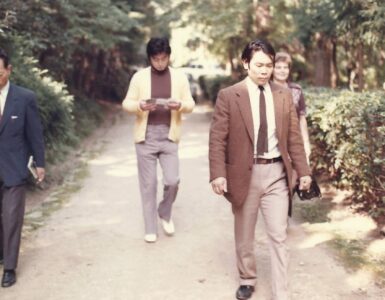
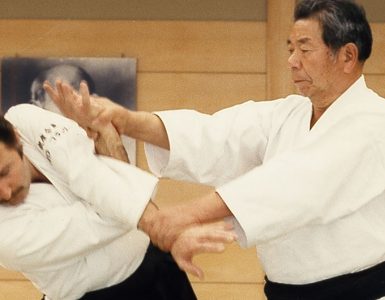







Add comment